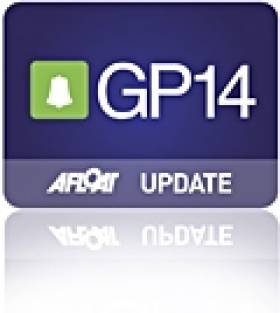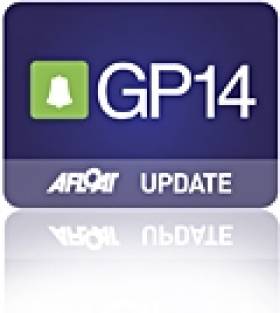Displaying items by tag: Tim Corcoran
Business as Usual for Corcoran and Brogan in GP Hot Toddy Event
Started in 1982 the season ending Hot Toddy event returned to it's originating Club in Larne on 22/23 October. Twenty two boats took to the water on a damp and overcast day with a Force 3-4 Easterly blowing over the hilly east coast of the lough, constantly varying in strength and direction and providing challenging racing conditions.
It seemed like business as usual for Tim Corcoran and Brendan Brogan, despite having sailed very little since the Irish Champs, as they reeled off three firsts in a row, starting and sailing very consistently. The first race was even more "business as usual" as John and Donal McGuinness took second place with President Richard Street and Dan Crilly third. Things were soon to change when silver fleet sailor (for how much longer?) Nigel Sloan and Michael Cox took second place holding off Norman and Rob Lee, While in the third race Curly Morris sailing with daughter Mel (bit of a comedown after sailing with Ger Owens in the last two events) took second with the rapidly improving Keith Louden and Dessie Hughes third.
Sunday was bright and clear although cool and as the wind backed slowly into a more northerly direction it became a little steadier in strength and direction. In the lightest conditions of the weekend (Force 3) Curly and Mel had another good pin end start but this time held on to lead at the first mark and throughout the race despite a strong challenge from Keith and Dessie who held off Tim and Brendan comfortably.
With the breeze strengthened to Force 3-4, Keith made a perfect pin end start and took a lead they were not to loose, despite strong challenges from both Norman and Rob and Nigel and Michael, the latter pair ultimately taking their second second place of the weekend. This was Keith and Dessie's first race win at a major event and well deserved. As both Keith and Richard have ben trying to "break their duck" by winning a race for a number of years, this was the inspiration Richard and Dan needed to do the same in the final race. With John and Donal in second place and well clear of the rest of the fleet their victory was hard earned with a lot of cover tacking! The Presidential celebrations could be heard all the way down to the leeward mark.
With a third and fifth in the first two races Tim and Brendan didn't need to sail the final race but for the next four boats the minor places were up for grabs. Race officer Richard Doig had reverted to an Olympic style course and with the wind backing steadily to the North the final reach became a bit of a cavalry charge with much tactical sailing. Robert and Ross Gingles managed to hold on to the inside berth at the final mark on Curly and Mel who in turn kept out Keith and Dessie and Alistair Duffin and Paul Whitcombe the latter having a quiet weekend by their standards. Despite slipping to 7th on the last beat this was enough to shade out Norman and Rob on tie break.
In the silver fleet Nigel and Michael's two second place finishes gave them a comfortable lead over Cathal Sheridan and David Lappin, with Steven Preston and Brenda Niblock doing enough to beat clubmates Lawrence Balham and T Brown
Lough Foyle Y.C. could be proud of their weekend as in addition to Keith and Dessie in second and Ken Louden and Ryan Louden also making the top ten. The bronze fleet was a L.F.Y.C. clean sweep! Kevin and J Lynch took the honours from Bill Johnston and James Hockley and Daniel and Gareth Gallagher in third place, with only eight points between the three of them. We look forward to seeing more of these up and coming sailors next year and not just when we go to Lough Foyle for one of our events.
The event marked 50 years of sailing at E.A.B.C. much of it dominated by a very strong GP14 fleet. Curly Morris was not the only sailor participating in the event to have launched their first GP14 fifty years ago – Commodore Paddy Thompson persuaded former N.I. champion Michael Hill to get his series 1 boat Trostan out of the garage and onto the water and revive a host of memories.
Corcoran and Brogan Best of Irish at GP14 Nationals
Newtownards Sailing Club hosted this year's GP 14 Championship of Ireland. The event attracted 46 boats from throughout Ireland and Great Britain. Race Officer Nigel Kearney set excellent courses in what was some of the most testing conditions in recent years.
Form race one the weather conditions were steadily worsening; average wind speeds were in excess of 20 mph with gusts to 25 mph and occasionally 30 mph. The dark heavy sky laden with squalls added to the drama. As the fleet got underway, boats capsized on and after the starting. The strong wind made tactics of less importance than just sheer boat handling.
Rarely, for the GP fleet, many competitors opted not to fly the spinnaker on the downwind legs and those that did ran the risk of a capsize especially at the gybe mark which got very congested with upturned boats. The windward legs sapped the energy of helm and crew. The race was won by Tim Corcoran from Sligo.
Race two and the weather seemed to deteriorate further. Adding to the problem was the sea state - in an unusual swell for the North end of Strangford Lough and after the gruelling first race gave the competitors even more to contend with. Winner of the second race was Carl Jeffs from Trimley Sailing Club. The second day's sailing was cancelled due even stronger winds.
As a total contrast day three was glorious sunshine but light winds. Tactics came into play here and the English pairing of Andy Tunnicliffe and Chris Robinson reigned supreme, winning both races to give them the Championship overall.
Results: 1st Andy Tunnicliffe and Chris Robinson RWYC; 2nd and top Irish boat Tim Corcoran and Brendan Brogan, SYC; 3rd Carl Jeffs and Steve Parker TSC.
1st Silver Fleet: Cathal Sheriadan and David Cook, Skerries SC; 2nd Lawrence Baalham and Tony Brown, Newtownards Sailing Club 3rd G O'Sullivan and H McNally
1st Bronze Fleet: Maurice Baalham and Gary Brown, Newtownards Sailing Club; 2nd Bill Johnston and Styephen Byrne LFYC; 3rd I Beattie Orr and R Murray SDC.































































